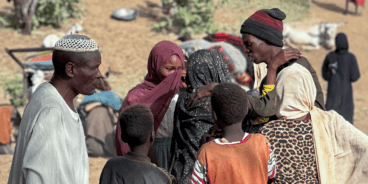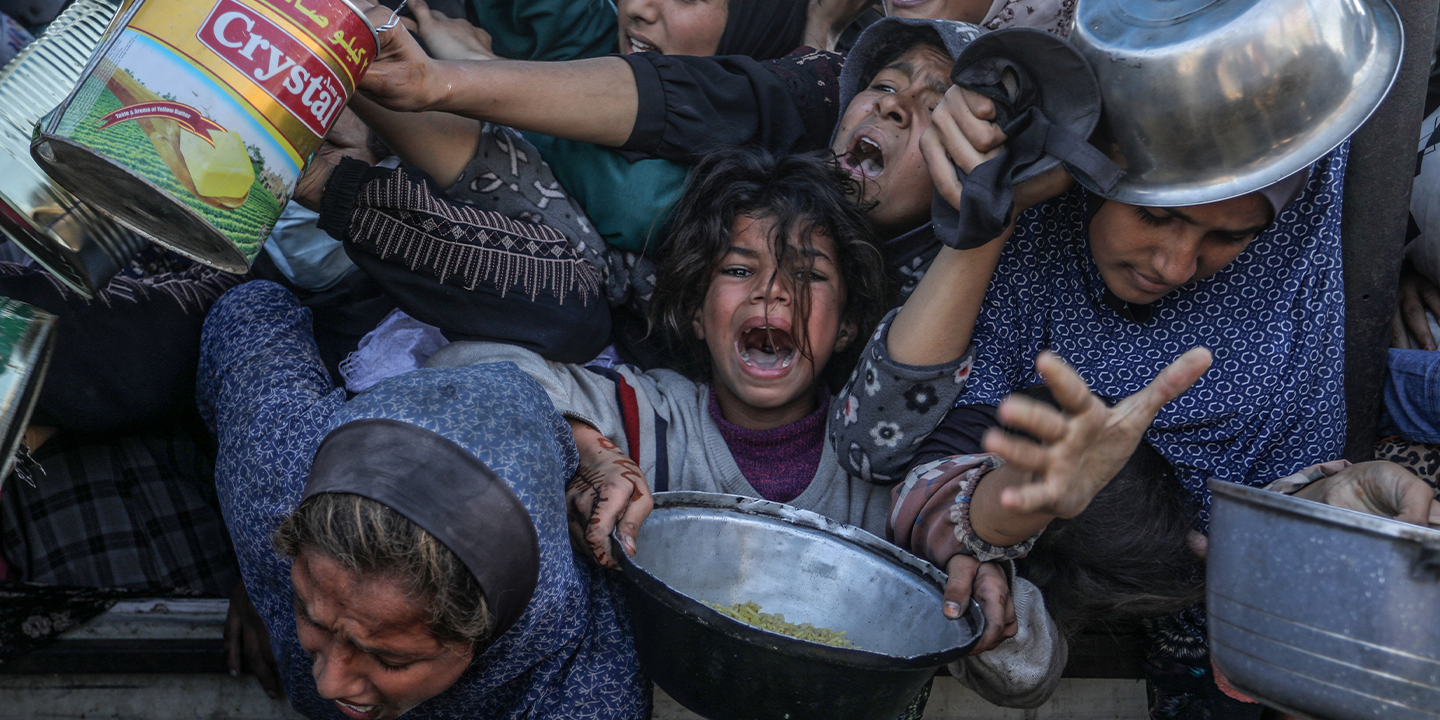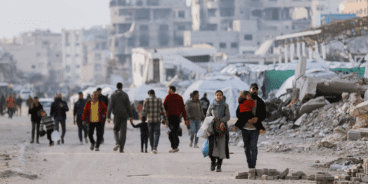

Atrocity Alert No. 423: Israel and the Occupied Palestinian Territory, Ukraine and Atrocity Risks and Content Moderation
Atrocity Alert is a weekly publication by the Global Centre for the Responsibility to Protect highlighting situations where populations are at risk of, or are enduring, mass atrocity crimes.
INCREASING NUMBER OF ORGANIZATIONS DETERMINE ISRAEL’S CONDUCT IN GAZA IS GENOCIDE
In December reports released by leading international human rights and humanitarian organizations – specifically, Amnesty International, Human Rights Watch (HRW) and Médecins Sans Frontières (MSF) – have joined a growing number of experts and groups naming Israel’s conduct against Palestinians in Gaza a genocide. According to Amnesty International, Israel has committed acts prohibited under the Genocide Convention with specific intent to destroy Palestinians in Gaza following 7 October 2023. Meanwhile, HRW determined that Israeli authorities are responsible for the crime of extermination and acts of genocide. MSF confirmed these findings, with its Secretary General, Christopher Lockyear, stating, “What our medical teams have witnessed on the ground throughout this conflict is consistent with the description provided by an increasing number of legal experts and organizations concluding that genocide is taking place in Gaza.”
The findings of these reports are consistent with earlier reporting, documentation and warnings by countless civil society organizations and UN mechanisms and experts. As early as 13 October 2023 Palestinian human rights organizations warned of the risk of genocide and called on third states to uphold their obligations under the Genocide Convention and “urgently intervene to protect the Palestinian people against genocide.” The Global Centre for the Responsibility to Protect also outlined the risks of genocide at that time and through multiple issues of Atrocity Alert and other publications since then. In March 2024 the UN Special Rapporteur on the situation of human rights in the Palestinian territories occupied since 1967 concluded that there were “reasonable grounds to believe that the threshold indicating Israel’s commission of genocide is met.” In November 2024 the UN Special Committee to Investigate Israeli Practices Affecting the Human Rights of the Palestinian People and Other Arabs of the Occupied Territories determined that Israel’s methods of war in Gaza are “consistent with the characteristics of genocide.”
Since January 2024 the International Court of Justice (ICJ) has issued three binding rulings that list urgent measures the Israeli authorities must take to prevent genocide against Palestinians and allow necessary aid to enter Gaza. Israel has consistently defied these provisional measures orders and its obligations as an occupying power under International Humanitarian Law. Over 46,000 Palestinians have been killed in the last fifteen months, according to Gaza’s Ministry of Health. During December alone Israel blocked 55 out of 60 humanitarian aid missions to North Gaza and forced the last major functioning hospital in northern Gaza out of service. The extent of civilian harm has compelled more states to support South Africa’s case at the ICJ concerning alleged violations of Israel’s obligations under the Genocide Convention. On 6 January Ireland submitted a declaration of intervention, followed by Cuba on 13 January, joining a growing list of countries seeking to present legal arguments, including Nicaragua, Mexico, Colombia, Chile, Libya, Spain, Bolivia, The Maldives, Türkiye and the State of Palestine.
The international community must act to end the culture of impunity, which has enabled the ongoing commission of atrocity crimes, including acts of genocide, across Gaza. It is imperative that a ceasefire agreement be reached and implemented immediately. Israel must ensure full compliance with all provisional measures issued by the ICJ, and third states must uphold their duty to prevent and punish genocide, employing all means at their disposal, including halting arms transfers to Israel.
ATTACK ON ZAPORIZHZHIA, UKRAINE, CAUSES HIGHEST CIVILIAN CASUALTIES IN TWO YEARS
On 8 January two aerial bombs struck an industrial facility in the southeastern Ukrainian city of Zaporizhzhia, killing 13 civilians and injuring 110 others. The UN Human Rights Monitoring Mission in Ukraine (HRMMU) reported that many victims were killed and/or injured on the street or on public transportation because the strikes occurred in the afternoon when many workers at the facility were leaving for the day. The attack caused the highest number of civilian casualties (killed and injured) in a single incident in almost two years, according to the HRMMU.
The HRMMU documented at least 2,064 civilians were killed and 9,089 injured in 2024, marking a 30 percent increase from 2023 with 1,971 killed and 6,626 injured. According to the HRMMU, the increasing toll on civilians from aerial bombardment directly results from the modification of bombs, allowing them to glide instead of fall when released, extending the range and inaccuracy of the missiles further from the front lines of the conflict. The Head of the HRMMU, Danielle Bell, responded to the attack in Zaporizhzhia, saying that, “Aerial glide bombs have become one of the greatest threats to civilians in cities along the frontline… It was entirely foreseeable that using such weapons in a city during the day would result in significant civilian casualties.”
The HRMMU has also reported on the consistent use of torture against Ukrainian civilians and military personnel, use of sexual violence and summary executions by Russian forces, among other abuses. These abuses, alongside both indiscriminate and targeted attacks on civilians and civilian infrastructure, are prohibited under international law and amount to war crimes and crimes against humanity.
Since the full-scale Russian invasion of Ukraine began in February 2022, at least 12,300 civilians, including over 650 children, have been killed in the conflict. Over 700 medical facilities and 1,500 educational facilities have been destroyed alongside countless homes, cultural centers, energy facilities and more. The conflict has internally displaced 3.7 million people, while 6.8 million have fled to other countries. According to the UN, 22.9 million people currently need humanitarian assistance.
The Global Centre for the Responsibility to Protect’s Ukraine expert, Sarah Hunter, said, “As we near three years of full-scale war in Ukraine, the international community must explore innovative ways to end the widespread suffering and better protect civilians from incessant bombardments. Ukrainian civilians have the right to live in peace and safety from these bombardments, and it is the international community’s moral duty to ensure this right becomes a reality.”
META’S RETREAT FROM CONTENT MODERATION MAY FUEL HATE SPEECH AND DISINFORMATION
On 7 January Meta Platforms, Inc., the parent company of Facebook, Instagram and WhatsApp, among others, announced the end of its third-party fact-checking program, beginning in the United States. Simultaneously, Meta has quietly removed major sections of its hate speech policy, enabling users to post derogatory content with little regulation. These changes will allow hate speech to proliferate, dehumanizing and ostracizing specific communities – including LGBTQIA+ people, people of color, women, immigrants and other marginalized groups – while removing protections for those targeted.
These developments come amid a shifting landscape where concerns about “excessive censorship” have prompted social media platforms to rollback content moderation. UN High Commissioner for Human Rights Volker Türk warned, “When we call efforts to create safe online spaces ‘censorship’, we ignore the fact that unregulated space means some people are silenced – in particular those whose voices are often marginalized. At the same time, allowing hatred online limits free expression and may result in real world harms.”
While Meta has not formally announced the details of its new strategy, Mark Zuckerberg, Meta’s Chief Executive Officer, said they plan to adopt “Community Notes” like X (formerly Twitter). Community Notes allows users who participate in the program to write fact-checks for any post on X. However, without a centralized fact-checking program, this approach will severely undermine information credibility while creating dangerous environments where marginalized communities can be targeted with impunity.
Meta has continuously struggled with curbing hate speech and mis-/disinformation on its platforms, and the absence of effective content moderation has been exploited, amplifying risks for populations in several contexts. For instance, in the months and years prior to the 2017 Rohingya genocide, hate speech and anti-Rohingya content, including language that called for violence to be committed against the Rohingya, proliferated on Facebook in Myanmar (Burma). In 2018 the UN found that Facebook served a “determining role” in fueling atrocities against the Rohingya. Likewise, in Ethiopia, the UN Special Adviser on the Prevention of Genocide warned in October 2022 that hate speech and incitement to genocidal violence on social media were “fueling the normalization of extreme violence.” Facebook’s algorithms amplified harmful rhetoric targeting the Tigrayan community while the platform’s content moderation systems failed to detect and respond appropriately to such content, inflaming ethnic tensions and inciting violence during the 2020-2022 armed conflict.
Social media platforms and technology companies have obligations to respond to and moderate disinformation, hate speech and incitement. Meta’s retreat from fact-checking and its narrowing definition of hate speech fail to adequately address atrocity risk factors on its platforms. Rather than abandoning content moderation, Meta and other social media platforms should strengthen the consistency and effectiveness of such programs to mitigate potential harm. Users of social media platforms must remain vigilant regarding information circulated on these platforms and take action to report hate speech and disinformation that may incite violence, hatred and discrimination.
Related Content


Atrocity Alert No. 434: Sudan, Ethiopia and the UN Human Rights Council
